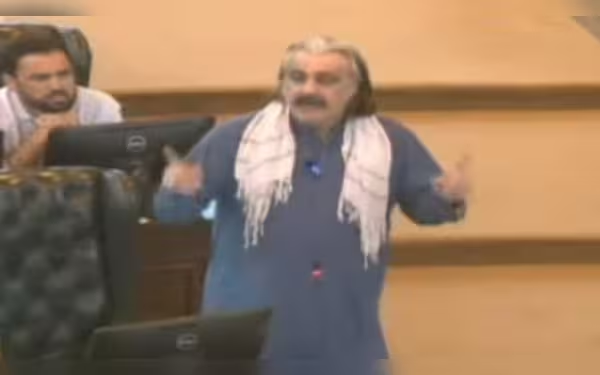Saturday, November 16, 2024 07:51 PM
CM Gandapur Claims He Was at KP House During Disappearance
- Gandapur insists he was at KP House during protests.
- Clashes erupted between PTI workers and law enforcement.
- Minister Tarar accuses Gandapur of staging a drama.
 Image Credits: geo
Image Credits: geoCM Gandapur claims he was at KP House during his disappearance amid PTI protests, escalating political tensions in Khyber Pakhtunkhwa.
PESHAWAR: The political landscape in Khyber Pakhtunkhwa (KP) has been shaken by the recent actions of Chief Minister Ali Amin Gandapur, who made headlines after resurfacing in the provincial assembly following a daylong disappearance. His absence raised eyebrows, especially during a time when Pakistan Tehreek-e-Insaf (PTI) was attempting to stage a protest in Islamabad amidst the imposition of Section 144, which restricts political gatherings. Gandapur, however, has firmly stated that he was at the KP House the entire time, dismissing any claims of his arrest.
During a passionate address to the provincial assembly, Gandapur asserted, "Police raided the KP House multiple times [...] Listen IG [Inspector-General of Police]. I was there the whole night." His comments came after PTI faced significant challenges while trying to mobilize support for the independence of the judiciary and the release of its founder, Imran Khan, who has been imprisoned for over a year.
The situation escalated as clashes erupted between law enforcement and PTI workers, with both sides accusing each other of initiating violence. In a dramatic turn of events, the provincial assembly passed a resolution demanding the recovery of the chief minister within 24 hours, highlighting the urgency and seriousness of the situation.
Gandapur did not hold back in his criticism of the authorities, particularly targeting Islamabad IGP Nasir Ali Rizvi. He claimed that the police had not only raided the KP House but had also mistreated staff and women present there. "It [KP House] is our property, and they fired on us directly," he declared, framing the police actions as an attack on the province's autonomy. He expressed gratitude to PTI supporters for their solidarity with Imran Khan, stating, "They thought we couldn’t reach D-Chowk, but we did."
In a bold move, Gandapur announced his intention to file a first information report (FIR) against the Islamabad IG, insisting that an apology was warranted. He further criticized the current administration for denying permission for public gatherings, questioning their fear of PTI's mobilization efforts. "Why are they so afraid?" he asked, referring to the government's refusal to allow a rally at Minar-e-Pakistan.
As the political drama unfolded, Minister for Information and Broadcasting Attaullah Tarar accused Gandapur of staging a "drama" through his disappearance, suggesting that he irresponsibly fled a violent rally he was leading. Tarar emphasized the need for accountability, particularly in light of the tragic loss of a police constable's life during the unrest.
In response to the swirling rumors, Interior Minister Mohsin Naqvi clarified that Gandapur was not in the custody of any federal institution. He confirmed that law enforcement had conducted several raids at the KP House, suspecting the chief minister's presence, but ultimately found no evidence of him being there. Naqvi stated, "We do not have the knowledge if he has reached KP or not. However, camera footage of him fleeing the KP House is available," further complicating the narrative surrounding Gandapur's disappearance.
The unfolding events in KP highlight the intense political climate in Pakistan, where tensions between the government and opposition parties continue to escalate. As the situation develops, it remains crucial for citizens to stay informed and engaged, as the outcomes of these political maneuvers could have lasting implications for the governance and stability of the region. The actions of leaders like Gandapur not only shape the immediate political landscape but also influence public perception and trust in the political system as a whole.













